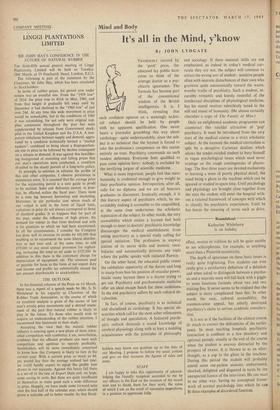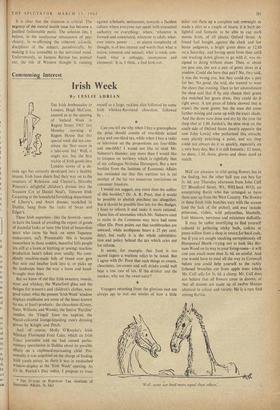Mind and Body
Mind, y'know It's all in the
LYDG ATE
By JOHN VIGOROUSLY tutored by the 'posh' press, the educated lay public have come to think of the average doctor as a psy- chiatric ignoramus. The formula has become part of the conventional wisdom of the British intelligentsia. It is, I think, revealing that such confident opinion on a seemingly techni- cal subject should be held by people with no apparent qualification. One never hears a journalist grumbling this way about cardiology—quite understandably, since the sub- ject is so technical that the layman is forced to take the profession's competence on this matter entirely on trust. Psychiatry commands. no such modest deference. Everyone feels qualified to pass some opinion here: nobody is excluded by the terrifying jargon of scientific medicine.
What is more important, people feel that mere humanity is credential enough to give weight to their psychiatric opinion. Introspection, after all, calls for no diploma and we are all honours graduates in discontent. Ironically enough, it is this literary aspect of psychiatry which, by un- avoidably making it accessible to the unqualified, at the same time undermines the scholastic reputation of the subject. In other words, the very accessibility which makes a layman feel bold enough to sneer at doctors' psychiatric knowledge discourages the medical establishment from seeing psychiatry as a special study calling for special initiation. The profession is anyway jealous of its secret skills and esoteric voca- bularies and automatically jettisons any topic where the public speaks with initiated fluency.
On the other hand, the educated public resent the cabbalistic superiority of the doctor and long to usurp from him his position of oracular power. Inside many laymen there is a doctor trying to get out. Psychiatry and psychosomatic medicine offer an ideal escape hatch for these ambitions. In the end psychiatry suffers by such cultural de- valuation.
In fact, of course, psychiatry is as technical and disciplined as cardiology. It has special ob- scurities which call for the most sober refinements of thought and speculation. A balanced psychi- atric outlook demands a sound knowledge of cerebral physiology along with at least a nodding acquaintance with the principles of philosophy and sociology. If these essential skills are not emphasised, as indeed in today's medical cur- ricula they are not, the subject will continue to attract the wrong sort of student : sensitive people often with neurotic disturbances of their own who gravitate quite automatically toward the warm, womby truths of psychiatry. Such a student, in- curably romantic and keenly resentful of the intellectual disciplines of physiological medicine, has his moral receiver relentlessly tuned to the still sad music of humanity. (He almost certainly cherishes a copy of The Family of Man.) Only an enlightened academic programme can counteract this suicidal attraction of `pop' psychiatry. It must be introduced from the very start of the medical course as a strict scholastic subject. At the moment the medical curriculum is split by a deceptive Cartesian dualism which allows the tender-minded student to bury himself in vague psychological issues which need never impinge on the tough contingencies of physio- logy. The first three years are devoted exclusively to learning a mass of purely physical detail; the mind being a ghost in the machine which can be ignored or studied in spare time. Until psychology and physiology are brought close together from the start the student will enter the hospital with- out a rational framework of concepts with which to classify his psychiatric experiences. Until he has learnt the meaning of terms such as drive,
Roundabout
Katharine Whitehorn is on holiday affect, motive or volition he will be quite unable to see schizophrenia, for example, as anything more than a Pinterish eccentricity.
The depth of ignorance on these basic issues is really quite frightening. Few students can ever really give a satisfactory definition of a delusion and when asked to distinguish between a psycho- sis and a neurosis most will fall back with a giggle to some facetious formula about two and two making five. It never seems to be realised that the subject is more complicated than this. In other words the easy, cultural accessibility, the common-sense appeal, has utterly destroyed psychiatry's claim to serious academic considera- tion.
It is not as if the facilities of the clinical course de much to correct the deficiencies of the earlier years. In most teaching hospitals psychiatric instruction is confined to a few desultory and optional periods, usually at the end of the course when the student is anyway distracted by the prospect of exams. It is thrown in as an after- thought, as a sop to the ghost in the machine. During this period the student will probably attend some out-patient sessions; embarrassed. shocked, delighted and disgusted in turns by the unexpected licence of the interviews. He can react in no other way, having no conceptual frame- work of normal psychology into which he can fit these examples of disordered function. It is clear that the situation is critical. The urgency of the mental health issue has become a justified fashionable panic. The solution lies, I believe, in the intellectual renaissance of psy- chiatry; in re-affirming the coherent sciiquific disciplines of the subject; paradoxically, by making it less accessible to the untrained mind. Unfortunately, as Jacques Barzun has pointed out, the tide of Western thought 'is running against scholastic seriousness, towards a faceless culture where everyone can speak with evacuated authority on everything: where, 'whatever is formed and constituted, whatever is adult, what- ever exerts power . . . or exerts complexity of thought, is of less interest and worth than what :s native, common and sensual; what is weak, con- fused; what is unhappy, anonymous and elemental.' It is, I think, a bad look-out.







































 Previous page
Previous page